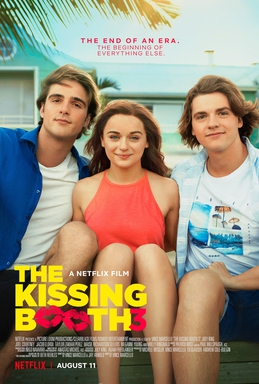The Kissing Booth 3: A decent end to a trilogy

Netflix releases the conclusion to their hit movie trilogy, “The Kissing Booth.”
August 27, 2021
Last week, Netflix released its third and final installment of the “Kissing Booth” series, a coming-of-age trilogy first released in 2018. Despite the heavy criticism and negative feedback the previous two films received, Netflix still decided to approve of a third film, as it was filmed alongside the sequel last year.
Netflix does not have the best track record for compelling teen films, and “The Kissing Booth” trilogy is no exception. The series centers around the “dating my best friend’s brother” trope, with quirky main character Elle Evans, played by Joey King, and her forbidden romance with popular high school jock, Noah Flynn (Jacob Elordi), who is the brother of her best friend Lee (Joel Courtney). Although I am usually a fan of this trope, this movie did not do it justice. Although the movie’s wacky hijinks are enjoyable at times, the storyline and writing are terribly inconsistent. Most of the characters lack any redeeming qualities, and over half of each movie is filled with unnecessary montages. Elle’s relationships with her friend and boyfriend are flawed and problematic, not to mention that most of the cast look way too old to be playing, as commentary Youtuber Kennie J.D. puts it, “brooding hot 25-year-old teenager[s].”
The third installment returns with Elle as she is given the choice to either move across the country to go to Harvard with Noah or go to UC Berkeley with Lee. Meanwhile, she spends her final summer before college attempting to complete a bucket list with Lee, including everything from skydiving to replicating a real-life Mario Kart arena. Throughout the movie, Elle deals with the pressure to spend time with both her boyfriend and friends as much as possible before she goes to college, as well as a new family member in her home. (Spoilers ahead!)
Like the previous films, most of the characters are still unlikable. Elle is annoyingly selfish and portrays herself as an underprivileged girl despite living in a wealthy neighborhood in Los Angeles. Lee is the worst character in the film, acting like a whiny child throughout the movie, throwing a temper tantrum every time Elle wants to do anything that doesn’t involve him and going to Berkeley (not understanding the concept of a long-distance friendship). Noah refuses to help Elle with her bucket list but then gets upset when Elle chooses someone else to help her. Marcus, Elle’s second love interest and one of the few enjoyable characters in the sequel, now acts pushy and constantly pressures Elle to be with him despite knowing she has a boyfriend. The only redeemable characters are Lee’s girlfriend Rachel (Megan Young) and Noah’s friend Chloe (Maisie Richardson-Sellers), two beautiful women who are too supportive and kind to be associated with the main characters for so long.
The ending surprised me the most. Although Elle first decides to go to Harvard with Noah, she later chooses neither Lee nor Noah, instead choosing to go to the University of Southern California and study video game design. She also breaks up with Noah and stands up to Lee, calling him out for his childish behavior before she leaves, which was my favorite part of the film. Although Elle wasn’t my favorite character, I admit it was satisfying to see her finally make her choices for herself rather than for her closest (and toxic) friends and relationships. Throughout the series, Elle spent most of her time trying to please everyone else in her life and strained her relationships with them as a result. Elle realizing her worth as a person and learning to do things on her own helped to further her character development and somewhat improve the film.







